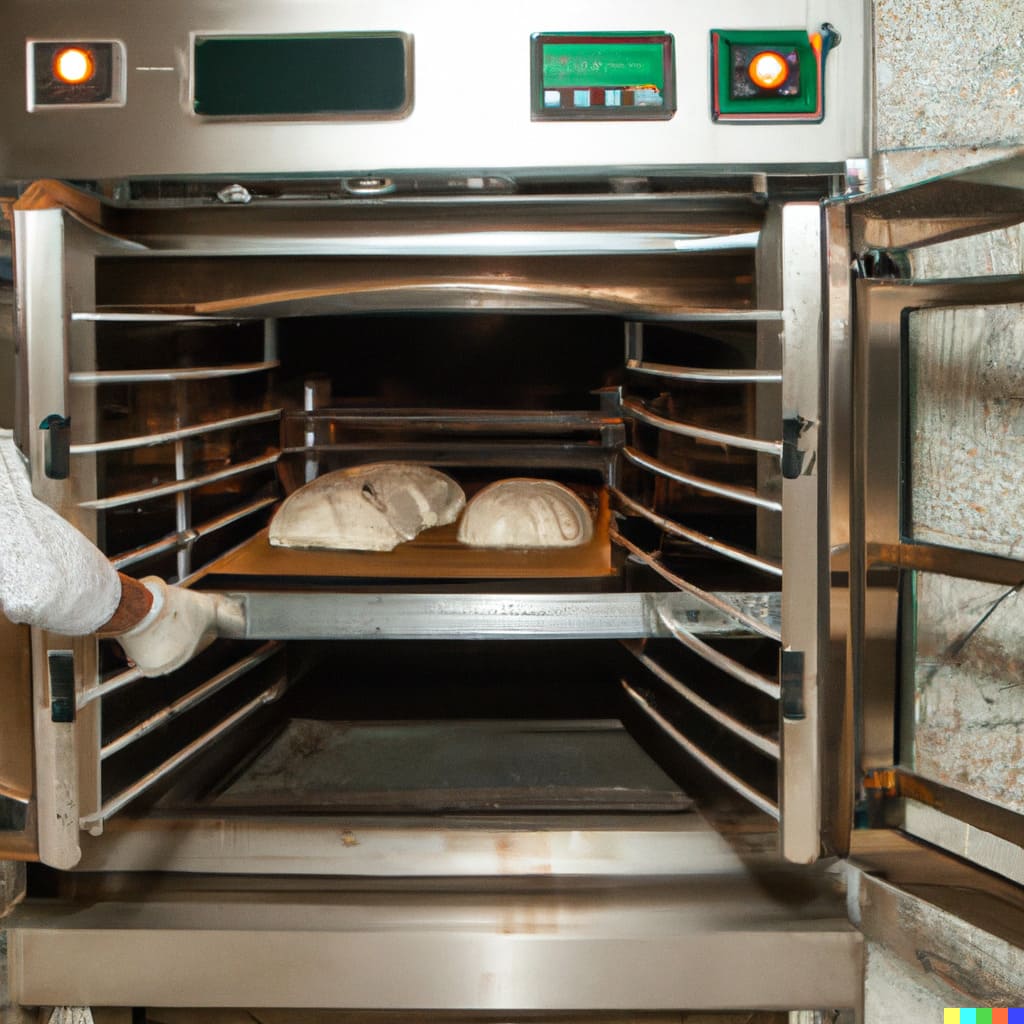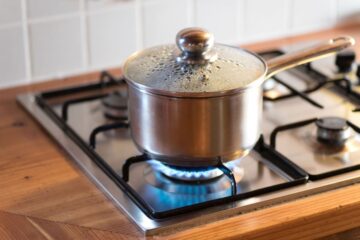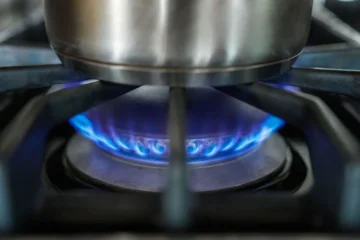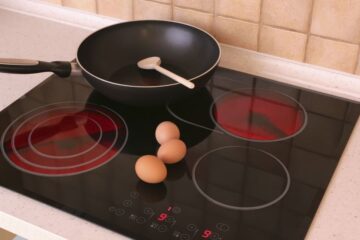When it comes to baking, one of the most critical decisions a baker has to make is using a gas or electric oven. This decision can make all the difference in the end product. Do bakers prefer gas or electric ovens? This is a debate that has gone on for years and one that shows no signs of slowing down. In this blog post, we will explore both sides of the oven debate to understand better which type of oven is best for baking.
How Does A Gas Oven Work?
A gas oven works by using a gas burner to heat the oven. The burner is located at the bottom of the oven, and the heat it produces is circulated by a fan or convection system. The heat is controlled by a thermostat or a simple valve regulating the burner’s gas flow. The burner ignites when the oven is turned on, and the heat is distributed throughout the oven. The oven temperature can be adjusted by adjusting the gas flow to the burner.
How Does An Oven Work Electric?
An electric oven uses electricity to heat elements, typically made of metal, located at the top and bottom of the oven. These elements heat up and radiate heat into the oven cavity, where the food is placed. The oven also has a thermostat that controls the temperature and a fan that circulates the hot air to ensure that the food cooks evenly. When you set the desired temperature on the oven’s control panel, the thermostat signals the heating elements to turn on or off as needed to maintain the set temperature.
What Kind Of Oven Do I Have?
To determine whether you have a gas or electric oven, you can start by checking the power source for the oven. If your oven is connected to a gas line, it is likely a gas oven. It is likely an electric oven if it is connected to an electrical outlet.
Another way to determine this is by looking at the control panel of your oven. A gas oven will typically have knobs for controlling the temperature and settings. In contrast, an electric oven will have digital or button controls. Finally, you can check the manual that came with your oven or look up the model number online to see the specifications of your oven.
Do Bakers Prefer Gas Or Electric Ovens?
It depends on the baker and their specific needs and preferences. Some bakers prefer gas ovens because they heat up quickly and allow for more precise temperature control.
Others may prefer electric ovens because they tend to heat more evenly and have more consistent temperatures throughout the oven. Ultimately, the choice between a gas or electric oven will depend on the baker’s specific needs and the type of baking they do.
Do Chefs Prefer Gas Or Electric Ovens?
It is a matter of personal preference. Some chefs prefer gas ovens because they heat up quickly and provide more direct heat, which can benefit specific cooking techniques. Other chefs prefer electric ovens because they tend to be more precise in temperature control and are often better for baking.
Moreover, many professional chefs prefer gas ovens because they provide more consistent heat and can be easier to control. The flame of a gas oven can also be adjusted more quickly and efficiently than the temperature of an electric oven.
However, electric ovens tend to have more advanced features, such as self-cleaning options and convection cooking. Ultimately, choosing between a gas or electric oven depends on the chef’s preferences, cooking style, and the cuisine they specialize in.
Do Ovens Use Gas Or Electricity?
Ovens can use either gas or electricity as a power source. Gas ovens use natural gas or propane as a fuel source to heat the oven. They tend to heat up quickly and provide more direct heat, which can benefit specific cooking techniques. On the other hand, electric ovens use electricity to heat the oven. They tend to have more precise temperature control and are often better for baking. Some ovens can use gas and electricity, known as a dual fuel ovens.
Gas Oven Vs Electric Oven Pros And Cons.
Gas Oven Pros:
-
Faster heating
Gas ovens heat up faster than electric ovens, saving cooking time.
-
Better temperature control
Gas ovens are more responsive to temperature changes, making it easier to maintain a consistent temperature while cooking.
-
More versatile cooking
Gas ovens can be used for various cooking methods, such as broiling, roasting, and baking.
-
Cost-effective
Gas ovens are generally cheaper to operate than electric ovens, especially in areas where natural gas is less expensive than electricity.
Gas Oven Cons:
-
Installation
Gas ovens require a gas line, which can be more complicated and expensive than installing an electric oven.
-
Maintenance
Gas ovens may require more maintenance than electric ovens, such as regularly cleaning the burners and adjusting the flame.
-
Safety
Gas ovens have a higher risk of gas leaks and other safety hazards, which can concern some homeowners.
Electric Oven Pros:
-
Easy installation
Electric ovens can be easily plugged into a standard electrical outlet, making them simple to install.
-
Safety
Electric ovens are generally safer than gas ovens, as there is no risk of gas leaks or other hazards.
-
Consistent heating
Electric ovens are known for providing consistent, even heating throughout the cooking process.
-
Energy efficient
Electric ovens are typically more energy efficient than gas ovens, which can save money on utility bills.
Electric Oven Cons:
-
Slower heating:
Electric ovens take longer to heat up than gas ovens, which can be a disadvantage when cooking.
-
Temperature control:
Electric ovens are less responsive to temperature changes, making it more challenging to maintain a consistent temperature while cooking.
-
Cost:
Electric ovens tend to be more expensive than gas ovens in terms of the initial purchase price and operating costs.
How To Choose The Right Commercial Oven For Your Bakery?
When choosing a commercial oven for a bakery, there are several factors to consider:
Capacity
Consider the size and capacity of the oven. How many loaves of bread or pastries will you be baking at one time? This will help you determine the size and number of necessary ovens.
Fuel type
Choose between electric or gas ovens. Gas ovens tend to heat up faster and provide better temperature control, but electric ovens are generally more energy efficient.
Cooking features
Look for ovens with features that will be beneficial to your bakery, such as convection cooking, steam injection, and programmable controls.
Brand and model
Research different brands and models of commercial ovens and read reviews from other bakers to get an idea of their performance and reliability.
Ease of maintenance
A oven that is easy to clean and maintain will save time and money in the long run.
Safety and certifications
Consider the safety features of the oven and ensure that it meets the necessary certifications and regulations for your area.
Budget
Compare prices of ovens and evaluate which model is the best choice for your bakery in terms of cost-benefit.
- Do You Need A Range Hood For An Induction Cooktop?
- How To Cook Pancakes On Induction Cooktop? (Ultimate Guide)
Why do You need To Consider The Heating Speed In Your Oven?
The heating speed of an oven is an essential factor to consider because it affects the cooking time and the outcome of the food. A faster heating oven will allow you to start cooking your food sooner, which can be especially useful if you are short on time or have guests coming over. Also, a faster heating oven can help to cook food more evenly, as it will heat up to the desired temperature faster and maintain that temperature more consistently.
However, it’s also essential to remember that some recipes may require a slower heating process to achieve the desired result. For example, delicate pastries may need to be baked at a lower temperature to prevent them from burning or becoming too dry. So, considering an oven’s heating speed can help you achieve better and more consistent results in your cooking.
How To Use a Gas Oven For Baking?
Using a gas oven for baking is relatively straightforward. First, preheat the oven to the desired temperature by setting the thermostat or temperature control knob to the desired setting. Next, place your baking dish or pan on the center rack of the oven. If you are using a baking or cookie sheet, place it on the lower rack of the oven.
Once the oven has reached the desired temperature, carefully place your baking dish or pan into the oven and set the timer for the recommended baking time. Keep an eye on your baking as it cooks, and use a toothpick or cake tester to check for doneness. Once the baking is finished, please remove it from the oven and let it cool before serving or storing.
How To Bake In A Electric Oven?
Baking in an electric oven is also straightforward. First, preheat the oven to the desired temperature. This can typically be done by adjusting the temperature setting on the oven and waiting for the preheat indicator, or a preheat tone to signal that the oven has reached the desired temperature.
Next, prepare your baking dish or pan by greasing it or lining it with parchment paper. Then, add your batter or dough to the dish and place it in the oven.
Be sure to place the dish in the center of the oven to ensure even baking. Finally, set a timer for the recommended baking time and wait for your dish to finish. Once the timer goes off, use an oven mitt to remove the dish from the oven and let it cool before serving.
What Type Of Oven Do Professional Bakers Use?
Professional bakers typically use commercial-grade ovens designed explicitly for large-scale baking operations. These ovens can be gas or electric and come in various types, including deck ovens, convection ovens, and rack ovens.
Deck ovens are large, rectangular ovens with a stone deck that absorbs and retains heat, allowing for even baking. They are typically used for baking bread, pastries, and pizzas.
Convection ovens use a fan to circulate hot air, allowing faster and more even baking. They are commonly used for baking cakes, cookies, and pastries.
Rack ovens are large ones that can hold multiple racks at once, making them ideal for baking large quantities of goods. These ovens are usually used for baking bread, pastries, and various cakes.
Professional bakers may also use specialized ovens for proofing, roasting, or smoking.
Which Oven Is Best For Home Baking Business?
A variety of ovens can be used for home baking. Still, the best one for your business will depend on your specific needs and budget. Here are a few options to consider:
Convection oven:
These ovens have a fan that circulates the hot air, which helps to cook food more evenly and quickly. This can be a good option if you plan to bake many goods at once.
Commercial oven:
These ovens are designed for heavy-duty use in a commercial setting. They are typically more extensive and more expensive than a standard home oven. Still, they can handle larger batches of baked goods and have more precise temperature control.
Deck oven:
A deck oven is a commercial oven that has multiple decks, allowing you to bake several items at once. This can be a good option if you make various baked goods.
Combination oven:
This type of oven combines steam and convection cooking methods, which can provide added moisture to your baked goods, resulting in a better texture.
Problems Baking With Gas Oven
Baking with a gas oven can present a few problems for some people. One common issue is uneven heating; some oven parts are hotter than others. This can cause uneven cooking, where the food on one side may be burned while food on the other is undercooked. To fix this issue, it is essential to preheat the oven properly and to use a thermometer to check the temperature in different areas of the oven.
Another problem is that the gas flame may go out, resulting in heat loss. A dirty burner or a malfunctioning gas valve can cause this. To fix this, cleaning the burner and checking the gas valve is essential to ensure it is functioning correctly.
In addition, some people may find that the oven takes a long time to preheat, which can be caused by a lack of proper ventilation or a malfunctioning thermostat. To fix this, it is essential to ensure the oven is properly vented and to check the thermostat to ensure it is working correctly.
Overall Thoughts
Overall, the preference for gas or electric ovens among bakers is a matter of personal preference and depends on the specific needs and preferences of the baker. Both gas and electric ovens have their unique advantages and disadvantages, and the choice ultimately comes down to the specific requirements of the bakery and the baker’s individual preferences.
Some bakers may prefer the precise temperature control and instant heat-up of an electric oven. In contrast, others may prefer the even heat distribution and natural gas fuel source of a gas oven. Ultimately, the best oven for a baker will depend on the specific needs and preferences of the baker and the bakery.



